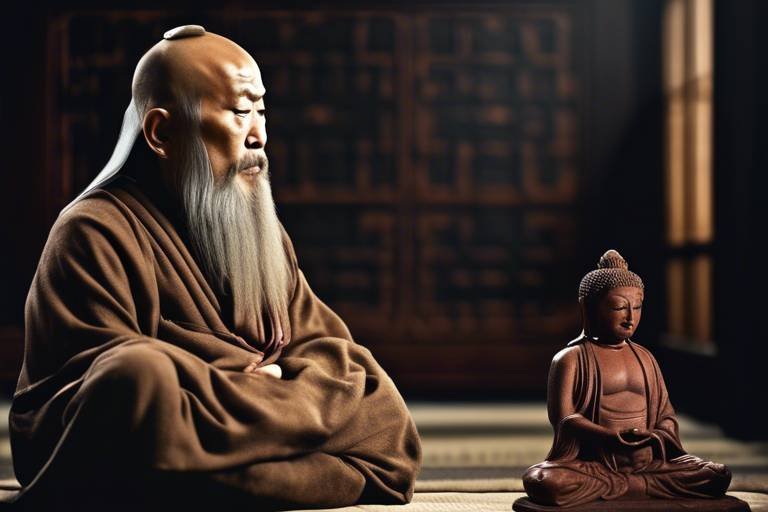The Influence of Eastern Philosophy on Western Thought
This article explores the profound impact that Eastern philosophical traditions have had on Western thought, highlighting key concepts, historical interactions, and the ongoing dialogue between these two rich intellectual traditions.
Understanding the historical interactions between Eastern and Western philosophies provides insight into how ideas have transcended cultural boundaries and influenced one another over centuries. The journey of these philosophies is like a river, winding through different landscapes, merging and diverging at various points. From ancient trade routes to the age of exploration, the exchange of ideas has been a constant theme. For instance, during the Silk Road era, merchants and travelers shared not only goods but also philosophies, creating a rich tapestry of thought that influenced both realms.
This section examines major ideas from Eastern philosophies, such as Taoism and Buddhism, and how they have shaped Western philosophical discourse and ethical frameworks. One cannot overlook the significant contributions of these philosophies to concepts of ethics, morality, and the nature of existence. In many ways, Eastern philosophies serve as a counterbalance to Western rationalism, reminding us that not everything can be understood through logic alone. It’s like having a conversation where one party speaks in facts while the other speaks in feelings, both essential for a complete understanding.
Zen Buddhism has introduced concepts of mindfulness and presence, significantly influencing Western psychology and self-help movements in contemporary society. The practice of being fully present in the moment can be likened to tuning a musical instrument; when we focus on the here and now, we achieve a harmonious state of mind. This shift towards mindfulness has led to a plethora of therapeutic techniques aimed at enhancing mental well-being. In fact, many psychologists now incorporate mindfulness practices into their sessions, illustrating how Eastern thought has found its way into modern mental health approaches.
The incorporation of mindfulness practices into therapeutic techniques demonstrates the practical application of Eastern philosophies in Western mental health approaches. Techniques such as meditation and breathing exercises are no longer viewed as niche practices but are now integral components of various treatment plans. This transformation is akin to planting a seed that grows into a flourishing tree, providing shade and comfort to those seeking relief from the stresses of life.
Eastern aesthetics, particularly from Zen traditions, have influenced Western art movements, leading to a fusion of styles and philosophies in creative expression. Artists like Mark Rothko and Jackson Pollock drew inspiration from Eastern concepts, emphasizing simplicity and spontaneity. The beauty of this fusion is evident in how it encourages artists to explore the depths of their emotions and the world around them, creating works that resonate on multiple levels. Just as a painter blends colors on a canvas, Eastern and Western philosophies blend to create a richer understanding of art and existence.
Taoism's emphasis on harmony with nature has resonated with Western environmental thought, promoting ecological awareness and sustainability. The idea that humans are not separate from nature but rather a part of it is a powerful concept that has found new relevance in today's world. As we face environmental challenges, the Taoist principle of living in harmony with the Earth serves as a guiding light, encouraging us to respect and protect our planet. This relationship is much like a dance, where every step must be in sync with the rhythm of nature to create a beautiful performance.
Contemporary thinkers continue to engage with Eastern philosophies, fostering a rich dialogue that challenges and enriches Western philosophical paradigms. This ongoing conversation is not just academic; it permeates everyday life, influencing how we view relationships, ethics, and our place in the universe. It’s like a vibrant marketplace where ideas are exchanged freely, leading to innovative ways of thinking and living.
The blending of Eastern and Western philosophies has led to interdisciplinary studies, enriching fields such as ethics, psychology, and environmental philosophy. Scholars and practitioners are increasingly recognizing that the answers to complex problems often lie at the intersection of different traditions. For example, integrating Eastern mindfulness techniques into Western therapeutic practices has proven to enhance emotional resilience and mental clarity. This cross-pollination of ideas is essential for fostering a holistic understanding of human experience.
The increasing globalization of ideas has facilitated a greater exchange between Eastern and Western philosophies, encouraging mutual understanding and respect among diverse cultures. In our interconnected world, the ability to appreciate and learn from different philosophical traditions is more important than ever. It’s like a rich tapestry woven from threads of various colors and textures, each contributing to a more beautiful and complex picture of human thought and experience.
- What are the main differences between Eastern and Western philosophies?
Eastern philosophies often focus on holistic and experiential understanding, while Western philosophies tend to emphasize analytical reasoning and individualism. - How has globalization affected the exchange of philosophical ideas?
Globalization has facilitated a greater exchange of ideas, allowing for a richer dialogue between different philosophical traditions and promoting mutual respect. - Can Eastern philosophies be applied to modern life?
Absolutely! Concepts like mindfulness from Eastern philosophies have been integrated into modern psychology and wellness practices, demonstrating their relevance today.

Historical Context
To truly appreciate the influence of Eastern philosophy on Western thought, it's essential to delve into the historical context that has allowed these two rich traditions to interact and evolve over centuries. The journey of ideas is often like a winding river, meandering through diverse landscapes, picking up sediments of knowledge along the way. From ancient trade routes to modern globalization, the exchange of philosophical ideas has shaped cultures and societies in profound ways.
The interactions began as early as the 5th century BCE, when early Western thinkers like Pythagoras and Socrates were likely influenced by Eastern philosophies through trade and exploration. However, it wasn't until the Middle Ages that more structured exchanges took place, particularly through the translations of texts from Arabic scholars who had preserved and studied ancient Greek and Eastern philosophies. This period saw the introduction of key concepts from Buddhism and Taoism into the Western intellectual landscape, which began to challenge the prevailing Aristotelian views.
During the Renaissance, a renewed interest in classical texts led to a further exploration of Eastern thought. Thinkers like Leonardo da Vinci and Rene Descartes were not only looking back at Greek philosophy but were also curious about the ideas emerging from the East. The invention of the printing press played a pivotal role in disseminating these diverse philosophical ideas, allowing them to reach a wider audience than ever before.
Fast forward to the 19th century, when Western intellectuals began to travel to the East, seeking wisdom and knowledge. Figures such as Ralph Waldo Emerson and Henry David Thoreau were deeply influenced by Eastern texts, particularly the Bhagavad Gita and various Taoist writings. Their work laid the groundwork for a more profound appreciation of Eastern philosophies, which began to infiltrate Western literature and thought.
In the 20th century, the dialogue intensified as Eastern philosophies found their way into various Western movements, such as Transcendentalism, which emphasized the inherent goodness of people and nature, echoing Taoist principles. Additionally, the rise of psychology saw figures like Carl Jung incorporating Eastern concepts into their theories, recognizing the universality of human experience.
Today, we stand at a remarkable intersection of cultures, where the globalization of ideas has created an ever-evolving dialogue between Eastern and Western philosophies. This exchange has not only enriched both traditions but has also fostered a sense of mutual respect and understanding. As we continue to explore these philosophical landscapes, we can appreciate how historical interactions have shaped our modern worldview, making it crucial to recognize the enduring legacy of these ancient ideas.

Key Philosophical Concepts
The intersection of Eastern and Western philosophies is a fascinating realm where profound ideas converge, creating a rich tapestry of thought that has influenced countless generations. At the heart of this dialogue are key philosophical concepts that have emerged from Eastern traditions, particularly from Taoism and Buddhism. These ideas not only challenge the Western mindset but also offer alternative perspectives that can enrich our understanding of existence, ethics, and the nature of reality.
One of the most significant contributions from Eastern philosophy is the concept of interconnectedness. In Buddhism, this idea is encapsulated in the principle of dependent origination, which suggests that all phenomena arise in dependence on conditions and are interconnected. This stands in contrast to the often individualistic perspective found in Western thought, which tends to emphasize the self as a separate entity. The implications of this interconnectedness are profound, encouraging a sense of compassion and responsibility towards others and the environment.
Another pivotal concept is the Middle Way in Buddhism, which advocates for a balanced approach to life, avoiding extremes of indulgence and asceticism. This philosophy resonates with contemporary Western discussions around moderation and well-being, illustrating how ancient wisdom can inform modern practices. It invites us to ask ourselves: How often do we find ourselves caught in the extremes of life? By embracing the Middle Way, we can cultivate a more harmonious existence.
Zen Buddhism, a branch of Mahayana Buddhism, introduces the practice of mindfulness, which has gained immense popularity in the West. Mindfulness encourages a focus on the present moment, fostering a deeper awareness of our thoughts and feelings. This concept has transcended its spiritual roots, finding its way into various aspects of Western life, including psychology and self-help. For instance, therapeutic techniques like Mindfulness-Based Stress Reduction (MBSR) exemplify how Eastern practices are being integrated into Western mental health frameworks, providing individuals with tools to navigate the complexities of modern life.
Moreover, Taoism offers a unique perspective on nature and existence through its emphasis on harmony and balance. The Tao, or "the Way," represents the natural order of the universe, and Taoist philosophy encourages individuals to align themselves with this order. This principle has found resonance in Western environmental thought, where the growing awareness of ecological issues calls for a more sustainable and harmonious relationship with nature. The Taoist idea of wu wei, or effortless action, suggests that sometimes the best approach is to go with the flow rather than resist it, a lesson that is increasingly relevant in our fast-paced, often chaotic world.
As we delve deeper into these key concepts, it becomes evident that the dialogue between Eastern and Western philosophies is not just an academic exercise; it is a living conversation that continues to evolve. The blending of these ideas fosters a more comprehensive understanding of life, prompting us to explore questions that challenge our assumptions and broaden our perspectives.
In summary, the influence of Eastern philosophical concepts such as interconnectedness, the Middle Way, mindfulness, and the harmony of Taoism enriches Western thought. These ideas not only provide alternative frameworks for understanding our existence but also encourage a more compassionate and sustainable approach to life. As we continue to explore this intellectual exchange, we can find valuable insights that resonate across cultures and time periods.

Zen Buddhism's Impact
Zen Buddhism has profoundly influenced not just individual lives but also the broader landscape of Western thought, particularly in the realms of psychology and self-help. It introduces a unique perspective on mindfulness and the importance of being present in the moment, concepts that resonate deeply in today's fast-paced world. Imagine a life where your thoughts are not racing ahead to tomorrow’s tasks or lingering on yesterday’s regrets; instead, you are fully immersed in the now. This transformative idea is at the heart of Zen practice, and its impact has been nothing short of revolutionary.
In recent years, the incorporation of mindfulness into Western therapeutic practices has become a trend that many mental health professionals advocate. Techniques derived from Zen Buddhism, such as meditation and breathing exercises, are now common tools used in various psychological treatments. These practices not only help individuals manage stress but also enhance their overall emotional well-being. Research has shown that mindfulness can lead to a significant decrease in anxiety and depression, making it an invaluable resource in modern psychology.
To illustrate this point, consider the following table that summarizes key benefits of mindfulness derived from Zen practices:
| Benefit | Description |
|---|---|
| Reduced Stress | Mindfulness techniques help lower cortisol levels, reducing stress and anxiety. |
| Enhanced Focus | Practicing mindfulness improves concentration and cognitive flexibility. |
| Emotional Regulation | Mindfulness fosters better awareness of emotions, aiding in emotional control. |
| Improved Relationships | Being present enhances communication and empathy in interpersonal relationships. |
Moreover, Zen Buddhism's influence extends beyond psychology into the realms of art and aesthetics. The principles of simplicity and tranquility found in Zen art have inspired numerous Western artists. Think about the serene landscapes of Japanese ink paintings; they evoke a sense of peace that many Western artists have sought to capture in their own works. This cross-pollination of ideas has led to a fusion of styles that enriches the creative expressions of both cultures. The aesthetic of Zen encourages artists to embrace imperfection and the beauty of nature, promoting a deeper connection to the world around them.
As we explore the impact of Zen Buddhism, it becomes clear that its teachings are more than just philosophical musings; they are practical tools for navigating the complexities of modern life. Whether through meditation, art, or interpersonal relationships, the principles of Zen continue to provide valuable insights that challenge the often chaotic nature of contemporary existence. In a world where distractions abound, the call to return to simplicity and presence is a powerful reminder of what truly matters.

Mindfulness in Modern Psychology
In recent years, the concept of mindfulness has emerged as a transformative force in the realm of modern psychology. Rooted in ancient Eastern traditions, particularly within the practices of Buddhism, mindfulness emphasizes the importance of being present and fully engaged in the moment. Imagine standing on a beach, feeling the sand between your toes, and hearing the gentle waves lapping at the shore. This is the essence of mindfulness—immersing oneself in the experience without distraction or judgment.
The integration of mindfulness into psychological practices has revolutionized therapeutic approaches. Therapists and psychologists have adopted mindfulness techniques, recognizing their profound ability to help individuals manage stress, anxiety, and depression. By teaching clients to focus on their thoughts and feelings without becoming overwhelmed, practitioners empower them to cultivate a greater sense of well-being. This shift towards mindfulness is not merely a trend; it's a fundamental change in how we understand and approach mental health.
One of the most notable frameworks that incorporates mindfulness is Mindfulness-Based Stress Reduction (MBSR). Developed by Dr. Jon Kabat-Zinn in the late 1970s, MBSR combines mindfulness meditation and yoga to help individuals cope with chronic pain and stress-related disorders. The effectiveness of MBSR has been supported by numerous studies, showcasing its ability to reduce symptoms of anxiety and improve overall quality of life. The table below highlights some key benefits of mindfulness practices:
| Benefit | Description |
|---|---|
| Reduced Stress | Mindfulness techniques help individuals manage stress by promoting relaxation and awareness. |
| Enhanced Focus | Practicing mindfulness improves attention and concentration, making it easier to tackle daily tasks. |
| Emotional Regulation | Mindfulness fosters the ability to observe emotions without judgment, leading to healthier responses. |
| Improved Relationships | Being present in interactions enhances communication and empathy, strengthening personal connections. |
Furthermore, mindfulness has found its way into various therapeutic modalities, including Cognitive Behavioral Therapy (CBT) and Acceptance and Commitment Therapy (ACT). These approaches incorporate mindfulness techniques to help clients recognize and change negative thought patterns. By focusing on the present moment, individuals can break free from the cycle of rumination that often exacerbates mental health issues.
In addition to clinical settings, mindfulness has also permeated everyday life, becoming a popular practice among individuals seeking personal growth. Many people now engage in mindfulness meditation as a daily routine, using apps and online resources to guide their practice. It's fascinating to see how a concept that originated thousands of miles away has taken root in the Western world, adapting to modern lifestyles while retaining its core principles.
As we continue to explore the intersection of Eastern philosophy and Western psychology, it's clear that mindfulness serves as a bridge, connecting these two rich traditions. By embracing mindfulness, we not only honor its origins but also pave the way for a more holistic understanding of mental health. So, the next time you find yourself overwhelmed, remember the beach: take a moment to breathe, observe, and simply be.
- What is mindfulness? Mindfulness is the practice of being present and fully engaged in the moment, without judgment or distraction.
- How does mindfulness benefit mental health? It helps reduce stress, improve focus, and enhance emotional regulation, leading to better overall well-being.
- Can mindfulness be practiced by anyone? Yes, mindfulness is accessible to everyone and can be practiced in various forms, such as meditation, yoga, or simple breathing exercises.
- What is Mindfulness-Based Stress Reduction (MBSR)? MBSR is a structured program that combines mindfulness meditation and yoga to help individuals cope with stress and chronic pain.

Art and Aesthetics
Art and aesthetics have always been deeply intertwined with cultural philosophies, and the influence of Eastern traditions, particularly those stemming from Zen Buddhism, has injected a refreshing perspective into Western art movements. Imagine stepping into a serene Zen garden, where every rock, every grain of sand is meticulously placed to evoke a sense of harmony and tranquility. This is not just a physical space; it’s a philosophy that encourages artists to embrace simplicity, balance, and the beauty of impermanence. The essence of this approach can be seen in various Western art forms that have sought to capture similar sentiments.
One of the most profound impacts of Eastern aesthetics on Western art is the shift towards minimalism. Artists began to strip away the excess, focusing instead on the essence of their subjects. This is akin to the Zen principle of “less is more,” where the absence of clutter leads to a deeper understanding and appreciation of the subject matter. The famous artist Donald Judd, for example, was influenced by these principles, creating works that emphasized clean lines and open spaces, inviting viewers to engage with the artwork on a more contemplative level.
Moreover, the concept of impermanence found in Eastern philosophies has also permeated Western art. This notion encourages artists to explore themes of transience and change, leading to works that resonate with the fleeting nature of existence. Take, for instance, the ephemeral art installations by contemporary artists like Andy Goldsworthy, who uses natural materials to create stunning pieces that will eventually return to the earth. This reflects a profound respect for nature and a recognition of the cycle of life, echoing the teachings of Taoism and Buddhism.
To further illustrate the impact of Eastern aesthetics on Western art, consider the following table that highlights key influences and examples:
| Eastern Influence | Western Artistic Response | Notable Artists |
|---|---|---|
| Zen Minimalism | Adoption of minimalism in art | Donald Judd, Agnes Martin |
| Impermanence | Exploration of transience in art | Andy Goldsworthy, Christo and Jeanne-Claude |
| Nature Harmony | Integration of natural elements in art | Robert Smithson, Takashi Murakami |
In addition to these influences, Eastern aesthetics have also encouraged a more contemplative approach to art appreciation in the West. This shift is seen in the way audiences engage with art, moving from mere observation to an immersive experience that invites introspection. The practice of mindfulness, rooted in Eastern traditions, encourages viewers to be present with the artwork, allowing them to connect with it on a deeper emotional level. This transformation in viewing habits reflects a broader cultural shift towards valuing experiences over material possessions, a concept that resonates strongly in today’s fast-paced world.
As we continue to explore the rich tapestry of art and aesthetics, it’s clear that the dialogue between Eastern and Western philosophies has not only enriched artistic expression but also fostered a deeper understanding of our shared human experience. The interplay of these diverse influences invites us to reflect on our own perceptions of beauty and meaning, urging us to embrace the complexity and simplicity of life itself.
- What is the main influence of Eastern philosophy on Western art? Eastern philosophy, particularly Zen Buddhism, emphasizes simplicity, balance, and impermanence, which has led to movements like minimalism in Western art.
- How does mindfulness relate to art appreciation? Mindfulness encourages viewers to engage deeply with art, promoting a contemplative experience that enhances emotional connection and understanding.
- Who are some notable artists influenced by Eastern aesthetics? Artists like Donald Judd, Andy Goldsworthy, and Takashi Murakami have incorporated Eastern principles into their work, reflecting themes of minimalism and nature.

Taoism and Naturalism
Taoism, an ancient Chinese philosophy, emphasizes the importance of living in harmony with the Tao, or the fundamental nature of the universe. This concept resonates deeply with the principles of naturalism, which posits that everything arises from natural properties and causes, and supernatural explanations are excluded or discounted. The fusion of Taoist thought with naturalistic principles has created a rich tapestry of ideas that encourages an appreciation for the interconnectedness of all things. Imagine a river flowing effortlessly, carving its path through the landscape; this is the essence of the Tao, urging us to align ourselves with the natural flow of life.
One of the central tenets of Taoism is the idea of wu wei, or "non-action." This does not imply inaction but rather suggests a way of being that is in tune with the natural world. By practicing wu wei, individuals can achieve a state of balance and harmony, allowing them to respond to life’s challenges with grace and ease. In a world often dominated by hustle and bustle, this Taoist principle offers a refreshing perspective: what if we could achieve more by doing less? This philosophy has found a significant echo in contemporary environmental movements, where the call for sustainable living is akin to the Taoist ideal of living in accordance with nature.
Furthermore, Taoism's reverence for nature has led to a profound influence on Western environmental thought. As issues like climate change and ecological degradation become increasingly urgent, the call for a return to naturalistic principles has never been more critical. By embracing the Taoist view that humans are but a part of the larger tapestry of life, Western thinkers and activists are advocating for a more sustainable and respectful relationship with the Earth. This shift in perspective can be likened to stepping back to see the bigger picture in a painting, where each brushstroke contributes to the overall masterpiece.
In addition, the dialogue between Taoism and naturalism has sparked interdisciplinary studies that explore the implications of these philosophies in various fields, such as ethics, psychology, and environmental science. For instance, the integration of Taoist principles into ecological ethics encourages a holistic approach to environmental stewardship, where the well-being of the planet is seen as intrinsically linked to human flourishing. This perspective challenges the anthropocentric view that has dominated much of Western thought and invites a more inclusive understanding of our place within the natural world.
To illustrate the impact of Taoism on modern environmental thought, consider the following table that outlines key concepts and their implications:
| Taoist Concept | Naturalistic Implication |
|---|---|
| Wu Wei (Non-Action) | Encourages sustainable practices that align with natural processes |
| Interconnectedness | Promotes a holistic view of ecosystems and biodiversity |
| Harmony with Nature | Advocates for respect and stewardship of natural resources |
In conclusion, the relationship between Taoism and naturalism is not merely an academic exercise; it is a call to action for individuals and societies alike. By embracing the wisdom of the Tao and recognizing our interconnectedness with the natural world, we can foster a more sustainable and harmonious existence. As we navigate the complexities of modern life, the teachings of Taoism offer valuable insights that can guide us toward a future where both humanity and nature can thrive in unison.
- What is Taoism? Taoism is an ancient Chinese philosophy that emphasizes living in harmony with the Tao, the fundamental nature of the universe.
- How does Taoism relate to naturalism? Taoism promotes the idea of living in balance with nature, which aligns with naturalistic principles that emphasize understanding the world through natural causes and effects.
- What is wu wei? Wu wei translates to "non-action" and refers to a state of being in which one aligns with the natural flow of life, allowing for effortless action.
- How can Taoism influence environmentalism? Taoism encourages respect for nature and interconnectedness, which can inspire sustainable practices and a holistic approach to environmental stewardship.

Modern Philosophical Dialogue
In today's interconnected world, the dialogue between Eastern and Western philosophies has become more vibrant and essential than ever. As we navigate through the complexities of modern life, thinkers from both traditions are engaging in a profound exchange of ideas that not only challenges conventional wisdom but also enriches our understanding of existence itself. This dialogue is not merely academic; it resonates deeply with the everyday experiences of individuals seeking meaning, purpose, and connection in an increasingly fragmented society.
One of the most exciting aspects of this modern philosophical dialogue is the way it encourages a fusion of perspectives. For instance, contemporary philosophers and spiritual leaders often draw on concepts from both Eastern traditions, such as Buddhism and Taoism, and Western thought, including existentialism and humanism. This blending allows for a more holistic approach to understanding life, one that acknowledges the value of both individual experience and universal truths. Thinkers like Thich Nhat Hanh and Alan Watts have played pivotal roles in bridging these worlds, making complex ideas accessible to a broader audience.
Moreover, interdisciplinary approaches have emerged as a significant outcome of this dialogue. Fields such as ethics, psychology, and environmental philosophy are increasingly integrating Eastern concepts. For example, the principles of compassion and mindfulness from Buddhist teachings are being incorporated into Western psychological practices, leading to innovative therapies that emphasize emotional well-being and self-awareness. This cross-pollination of ideas not only enhances our understanding of mental health but also promotes a more compassionate society.
As globalization continues to break down cultural barriers, the exchange of philosophical ideas becomes even more pronounced. The rise of digital platforms has enabled thinkers from diverse backgrounds to share their insights and engage in discussions that transcend geographical boundaries. This cultural exchange fosters mutual respect and understanding, allowing individuals to appreciate the richness of both Eastern and Western philosophies. It's like a dance, where each partner brings their unique steps to the floor, creating a beautiful and harmonious performance.
However, this dialogue is not without its challenges. There are instances where misunderstandings arise due to cultural differences, leading to misinterpretations of core concepts. For example, the Western emphasis on individualism can sometimes clash with Eastern notions of collectivism. Navigating these complexities requires a willingness to listen and learn from one another, fostering an environment where both traditions can coexist and thrive. It’s essential to approach these discussions with an open mind and a heart full of curiosity.
In conclusion, the modern philosophical dialogue between Eastern and Western thought is a dynamic and evolving landscape. It invites us to explore new ideas, challenge our assumptions, and ultimately, enrich our lives. By embracing this dialogue, we not only deepen our understanding of ourselves but also cultivate a greater sense of connection with others. In a world that often feels divided, this exchange of ideas serves as a reminder of our shared humanity and the universal quest for knowledge and meaning.
- What is the main focus of the modern philosophical dialogue?
The dialogue primarily focuses on the exchange of ideas between Eastern and Western philosophies, aiming to enrich understanding and address contemporary issues. - How have Eastern philosophies influenced Western thought?
Eastern philosophies, particularly Buddhism and Taoism, have introduced concepts like mindfulness and harmony with nature, significantly impacting Western psychology and environmental ethics. - What role does globalization play in this dialogue?
Globalization facilitates the exchange of philosophical ideas, allowing for a richer understanding and appreciation of diverse cultural perspectives. - Can Eastern and Western philosophies coexist?
Yes, they can coexist and enrich each other when approached with openness and respect for their unique contributions.

Interdisciplinary Approaches
In today's rapidly evolving intellectual landscape, the intersection of Eastern and Western philosophies has given rise to a fascinating tapestry of interdisciplinary approaches. This blending of ideas is not merely a superficial exchange; it represents a profound shift in how we understand complex issues that span across various fields such as ethics, psychology, and environmental philosophy. By integrating the rich traditions of Eastern thought with Western methodologies, scholars and practitioners alike are uncovering new pathways to knowledge and understanding.
Take, for instance, the field of ethics. Traditional Western ethical frameworks often emphasize individualism and rationality, but when we incorporate Eastern perspectives—like the communal focus of Confucianism or the interconnectedness promoted by Buddhism—we begin to see a more holistic approach to moral dilemmas. This is especially relevant in today's globalized society, where ethical decisions must consider a multitude of cultural perspectives. The dialogue between these philosophies encourages us to ask: How can we balance individual rights with communal responsibilities in our decision-making processes?
Furthermore, in the realm of psychology, the integration of mindfulness practices derived from Zen Buddhism has revolutionized therapeutic techniques. Therapists are increasingly adopting these practices to help clients manage stress and anxiety. This interdisciplinary approach not only enhances traditional psychological methods but also enriches our understanding of the human experience. As we explore the nuances of mental health, we can draw upon the wisdom of Eastern philosophies to foster a more comprehensive understanding of well-being.
Additionally, the environmental philosophy sector is witnessing a growing influence from Eastern thought, particularly through Taoism. The Taoist principle of living in harmony with nature resonates deeply in contemporary discussions about sustainability and ecological responsibility. By applying these ancient teachings to modern environmental challenges, we can cultivate a mindset that prioritizes ecological balance and promotes a symbiotic relationship with our planet.
As we delve deeper into these interdisciplinary approaches, it becomes clear that the blending of Eastern and Western philosophies offers a treasure trove of insights. They challenge us to rethink our established paradigms and encourage a more inclusive dialogue that respects and learns from diverse traditions. In a world that often feels fragmented, these connections remind us of the shared human experience that transcends cultural boundaries.
In conclusion, the interdisciplinary approaches that arise from the dialogue between Eastern and Western philosophies not only enrich our understanding of complex issues but also promote a more integrated view of knowledge. As we continue to explore these intersections, we pave the way for innovative solutions that can address the pressing challenges of our time.
- What are some key differences between Eastern and Western philosophies?
Eastern philosophies often emphasize collectivism and the interconnectedness of life, while Western philosophies tend to focus on individualism and rationality. - How can mindfulness practices from Eastern traditions benefit Western psychology?
Mindfulness practices can enhance therapeutic techniques by promoting self-awareness, reducing stress, and improving emotional regulation. - What role does Taoism play in contemporary environmental thought?
Taoism's emphasis on harmony with nature encourages a sustainable approach to environmental issues, advocating for balance and respect for the natural world. - Are there any modern philosophers who actively engage with Eastern philosophies?
Yes, many contemporary thinkers, such as Ken Wilber and Thich Nhat Hanh, explore the integration of Eastern and Western ideas in their work.

Globalization and Cultural Exchange
The phenomenon of globalization has transformed the way we interact with different cultures and philosophies around the world. In the past, ideas traveled slowly, often constrained by geographical boundaries and linguistic differences. However, today, with the advent of technology and the internet, the exchange of thoughts and beliefs has become almost instantaneous. This rapid flow of information has facilitated a profound engagement between Eastern and Western philosophies, leading to a rich tapestry of cultural exchange that reshapes our understanding of both traditions.
One of the most significant outcomes of this cultural exchange is the growing awareness and appreciation of Eastern philosophies in Western societies. Concepts such as mindfulness, meditation, and holistic well-being have gained immense popularity, influencing not only individual practices but also institutional frameworks. For instance, many Western corporations have begun to adopt mindfulness training as a way to enhance employee productivity and mental health. This shift illustrates how Eastern ideas are not merely being adopted but are also being integrated into the fabric of Western life, creating a hybrid culture that values both traditions.
Moreover, the arts have become a significant arena for this exchange. Artists from the West have increasingly drawn inspiration from Eastern aesthetics, leading to innovative forms of expression that blend techniques and philosophies. For example, the minimalist principles of Zen Buddhism can be seen in the works of contemporary Western artists, who emphasize simplicity and the beauty of emptiness. This cross-pollination of ideas not only enriches the artistic landscape but also fosters a deeper understanding of the underlying philosophies that inform these practices.
In educational settings, institutions are beginning to recognize the importance of incorporating Eastern philosophical teachings into their curricula. This is evident in the rise of courses focusing on Eastern thought, comparative philosophy, and intercultural studies. By exposing students to diverse philosophical perspectives, educators aim to cultivate a generation of thinkers who are not only knowledgeable about their own cultural heritage but also appreciative of others. This educational approach promotes a sense of global citizenship and encourages students to engage critically with the world around them.
However, it is essential to approach this cultural exchange with a sense of respect and authenticity. The danger of cultural appropriation looms large, where elements of Eastern philosophies might be stripped of their context and commodified. To combat this, dialogue and collaboration between Eastern and Western thinkers are crucial. By fostering mutual respect and understanding, we can ensure that this exchange enriches both traditions rather than dilutes them.
In conclusion, globalization has acted as a catalyst for the exchange of ideas between Eastern and Western philosophies, leading to a deeper understanding and appreciation of both. As we continue to navigate this interconnected world, the ongoing dialogue between these rich intellectual traditions will undoubtedly shape the future of philosophical thought and cultural expression.
- How has globalization affected the understanding of Eastern philosophies in the West?
Globalization has facilitated greater access to Eastern philosophies, allowing for their integration into Western thought, education, and practices like mindfulness. - What are some examples of Eastern philosophy influencing Western art?
Artists have incorporated Zen principles, such as minimalism and simplicity, into their works, creating a fusion of Eastern and Western artistic expressions. - Is cultural appropriation a concern in the exchange of Eastern and Western philosophies?
Yes, it is essential to approach cultural exchange with respect to avoid misrepresentation and commodification of Eastern traditions.
Frequently Asked Questions
- What are the main Eastern philosophies that have influenced Western thought?
Eastern philosophies such as Taoism and Buddhism have significantly shaped Western thought. These traditions introduce concepts like harmony with nature, mindfulness, and the interconnectedness of all things, which have been integrated into various Western philosophical and ethical frameworks.
- How has Zen Buddhism specifically impacted Western psychology?
Zen Buddhism has brought the practice of mindfulness to the forefront of Western psychology. Techniques derived from Zen practices are now commonly used in therapeutic settings to help individuals manage stress, anxiety, and emotional challenges, promoting a greater sense of presence and awareness in daily life.
- What role does Taoism play in contemporary environmental thought?
Taoism emphasizes living in harmony with nature, which resonates with modern environmental movements. This philosophy encourages a sustainable lifestyle and ecological awareness, prompting Western thinkers to adopt practices that respect and preserve the natural world.
- How do Eastern and Western philosophies engage in dialogue today?
Today, there is a rich dialogue between Eastern and Western philosophies, with contemporary thinkers exploring interdisciplinary approaches. This engagement fosters mutual understanding and respect, allowing for the blending of ideas that enrich fields such as ethics, psychology, and cultural studies.
- What is the significance of globalization in the exchange of philosophical ideas?
Globalization has facilitated a greater exchange of ideas between Eastern and Western philosophies. This interconnectedness encourages diverse cultures to share their philosophical insights, leading to a more comprehensive understanding of human thought and experience across the globe.


















